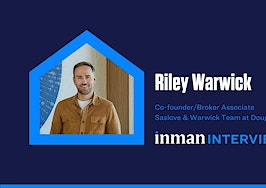There was a period of several years in the mid-2010s when the notion of virtual reality as a game-changing platform for real estate was everywhere. From VR showrooms at individual brokerages to entire companies going all in on the technology, virtual reality promised to be the next big thing.
At the time, people assumed that VR headsets would quickly become commonplace and that everyone would soon be watching movies, virtually vacationing, and visiting with friends and family via the technology.
It seemed an easy leap from there to the idea that real estate open houses and home tours would soon be primarily conducted using those same VR headsets.
So, why didn’t VR take off as expected? And does it still have a role to play in the real estate industry? We reached out to early adopters and proponents of VR tech to see how they view it today and what potential it still holds.
Drawback No. 1: No in-person contact
Ohio real estate broker Anthony Colantuono of Coldwell Banker Schmidt Realty was an early proponent of VR as a way to get more eyes on the home and facilitate showings for hard-to-pin-down buyer clients.
“I still do believe in today’s market VR does play a role, just not as big as I had expected,” Colantuono said recently via email. “I use Matterport to produce VR content, and it works great. I always tell my sellers that the agents and their clients that view the tour/3D model before seeing the house in person, when they do come to view the home it’s like a second showing already.”
However, Colantuono doesn’t believe that VR will replace in-person viewings and walk-throughs. “Maybe buyers are not ready to shop for a home like that. Even with the COVID virus, people wanted to come out and see the homes in person.”
Drawback No. 2: Prohibitively expensive to start up
For Aspen real estate broker Andrew Ernemann of Sotheby’s and owner of Aspen Starwood Properties, spending hundreds of thousands of dollars on a VR studio was worth it, considering the multimillion-dollar properties the technology helped him sell. While he’s had “great success” with VR, he isn’t sure it’s for everyone.
“My personal opinion is that VR is an incredible tool to sell pre-completion homes and development projects. I’ve had great success ‘showing’ such properties to clients, prospects and other brokers,” Ernemann said via email.
“That said, the equipment can be expensive and a bit technical for widespread use, and even if those barriers aren’t a big deal, the cost to create the VR home models can be expensive and time-consuming. It’s just not as simple as a 3D tour, video, or photos — or even renderings.”
However, while Ernemann admits that adoption of VR hasn’t been as widespread as he thought it would be when he installed his studio, every time there’s a push for VR, he thinks “it finds its way just a bit more into the mainstream.”
Drawback No. 3: Slow pace of adoption
When Engel & Völkers announced its partnership with immoviewer, it promised to put VR into every Engel & Völkers brokerage in North America. At the time, the company emphasized its view that VR and 3D technology was “not a fad” and predicted that 171 million consumers would be regularly using it by 2018.
While those predictions proved to be wildly optimistic, Paul Benson, license partner and global real estate advisor with Engel & Völkers Gestalt Group in Park City, Utah, still sees a place for the technology. “We are using VR regularly,” he wrote via email. “It helps show homes for those out of town as well as social distancing.”
While Benson has been using the technology for a couple of years, he knows he’s an early adopter. “It is pricey to film, and most people do not take the time to view the video through the proper VR format, so I think we have a ways to go. I believe COVID will speed this up in a good way as it will force those less comfortable with tech to become more so. I am hoping this anyway.”
What needs to happen for more widespread adoption of VR?
So, if VR hasn’t lived up to the hype so far, what needs to happen to make it more viable for more agents in more markets?
Affordability
VR will need to become more affordable to allow individual agents and teams to invest in it. This would decentralize the technology and make it more accessible, as well as allow it to meet more specialized needs, like those of agents who serve clients and markets specifically well-suited to the technology.
Personalization
One of the biggest problems with the early iteration of VR is the use of in-office studios, which hikes costs and forces potential buyers to make the trip to a real estate office to share a headset with other buyers.
Even before the intrusion of COVID-19, the desire for the security and convenience of in-home delivery services was rising in popularity. Now, people are more inclined than ever to favor an in-home shopping experience and less inclined to want to share spaces and equipment.
Focus
Part of the problem with the overly rosy projections for real estate VR was the idea that it would work for everyone in all markets. In reality, VR for real estate seems to work well for specific client categories and niches.
According to Andy Dane Carter of The Address Long Beach, “As a listing agent, the technology is great in some specific use cases, but on a wide scale in residential real estate, it’s a waste of money at this point. The technology and user adoption for most consumers is five to 10 years out.”
Some of the relevant categories for possible adoption include client niches like:
- Military families
- Long-distance relocation
- Investors
- International buyers
- Second-home buyers
- Luxury buyers
This also includes market niches like:
- Resort communities
- Farm and land
- New construction/development
- Commercial RE
By being more proactive in making VR affordable and accessible for the specialized markets and agents who can best put it to use, we may in time realize a portion of the promise of this technology. However, pretending it works for everyone does no one any favors.
Ultimately, the question for each agent and broker to answer is not, “Should I invest in VR?” but instead, “Does VR make sense for my business, my client base and my market specifically?”
Troy Palmquist is the founder and broker of The Address in Southern California. Follow him on Facebook, or connect with him on LinkedIn.













